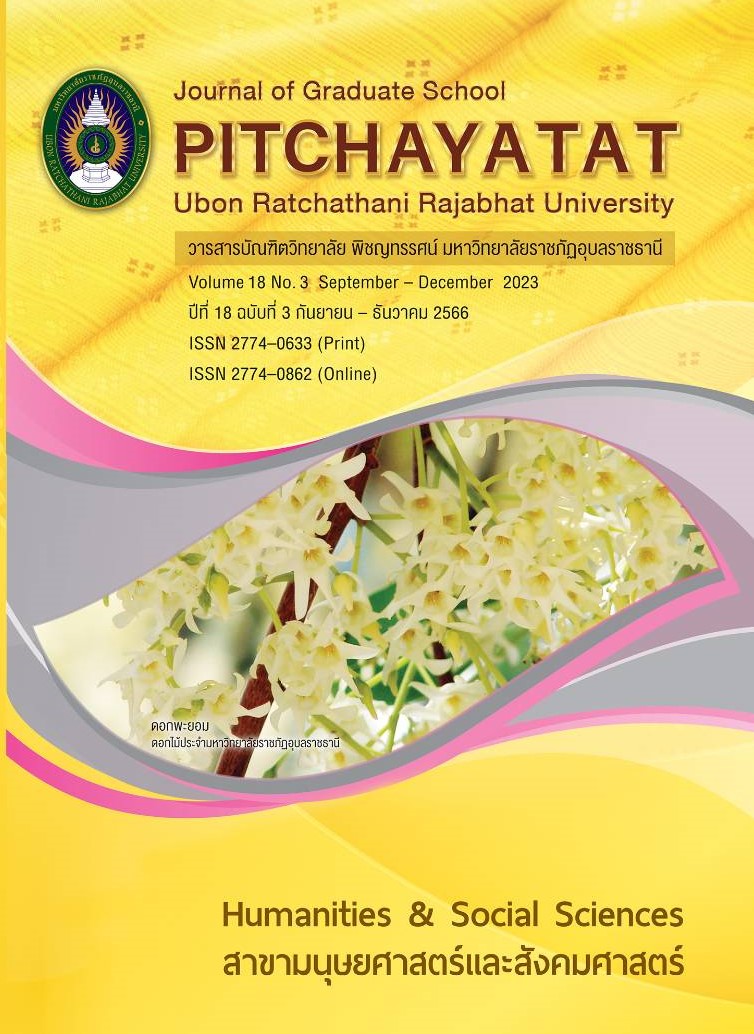การประเมินหลักสูตรครุศาสตรบัณฑิต (หลักสูตร 4 ปี) สาขาวิชาการศึกษาปฐมวัย (หลักสูตรปรับปรุง พ.ศ. 2562) คณะครุศาสตร์ มหาวิทยาลัยนครพนม
คำสำคัญ:
การประเมินหลักสูตร , การประเมินรูปแบบ CIPP , การศึกษาปฐมวัยบทคัดย่อ
การศึกษาวิจัยนี้มีวัตถุประสงค์เพื่อประเมินหลักสูตรครุศาสตรบัณฑิต (หลักสูตร 4 ปี) สาขาวิชาการศึกษาปฐมวัย (หลักสูตรปรับปรุง พ.ศ. 2562) คณะครุศาสตร์ มหาวิทยาลัยนครพนม ซึ่งการประเมินหลักสูตรใช้รูปแบบการประเมินแบบ CIPP เพื่อประเมินปัจจัยที่เกี่ยวข้องกับหลักสูตรใน 4 ด้าน คือ ด้านบริบท ด้านปัจจัยนำเข้า ด้านกระบวนการ และด้านผลผลิต กลุ่มเป้าหมายในการวิจัยครั้งนี้ คือ อาจารย์ประจำหลักสูตร นักศึกษา ผู้มีส่วนเกี่ยวข้องในการผลิตบัณฑิต จำนวน 238 คน เครื่องมือที่ใช้ ได้แก่ แบบสอบถาม และแบบสัมภาษณ์แบบมีโครงสร้าง สถิติที่ใช้ ได้แก่ ความถี่ ร้อยละ ค่าเฉลี่ย และส่วนเบี่ยงเบนมาตรฐาน และการวิเคราะห์เนื้อหา
ผลการวิจัยพบว่า
- การประเมินด้านบริบท พบว่า โดยภาพรวมมีความเหมาะสมระดับมาก ทั้งในด้านวัตถุประสงค์ของหลักสูตร โครงสร้างของหลักสูตร เนื้อหาสาระของหลักสูตร โดยวัตถุประสงค์ของหลักสูตรมีความเหมาะสม โครงสร้างของหลักสูตรมีความสอดคล้องกับวัตถุประสงค์ และเนื้อหาของหลักสูตรมีความสอดคล้องกับความต้องการของสังคมและสามารถนำไปใช้ได้จริง
- การประเมินด้านปัจจัยนำเข้า พบว่า โดยภาพรวมมีความเหมาะสมระดับมาก ทั้งในด้านแผนการดำเนินงานของสาขาวิชา ด้านคุณสมบัติอาจารย์ที่สอน/อาจารย์ที่ปรึกษาทางวิชาการ ด้านคุณสมบัติของผู้เรียน/การสอบคัดเลือก ด้านสภาพแวดล้อมทางกายภาพ วัสดุอุปกรณ์ ด้านการให้บริการ และการสนับสนุน โดยผู้สอนมีคุณสมบัติที่ความเหมาะสมกับรายวิชาที่สอน กระบวนการในการคัดเลือกผู้เรียนมีความเหมาะสม สภาพแวดล้อมทางกายภาพ วัสดุอุปกรณ์และสิ่งอำนวยความสะดวกต่าง ๆ ควรปรับปรุงระบบเชื่อมต่ออินเทอร์เน็ตให้มีความเร็วสูงมากขึ้น และควรมีเอกสารหนังสือตำราที่ทันสมัยมากขึ้น
- การประเมินด้านกระบวนการ พบว่า โดยภาพรวมมีความเหมาะสมระดับมาก ทั้งในพฤติกรรมการจัดการเรียนรู้ของผู้สอน ด้านการจัดการเรียนรู้ และด้านการฝึกประสบการณ์วิชาชีพครู โดยพฤติกรรมการจัดการเรียนรู้ของผู้สอนควรเน้นการนำเทคโนโลยีมาใช้ในการจัดการเรียนรู้ให้มากขึ้น
- การประเมินด้านผลผลิต พบว่า โดยภาพรวมมีความเหมาะสมระดับมาก ทั้งในด้านคุณลักษณะของนักศึกษาวิชาชีพครู และด้านบุคลิกภาพที่ส่งผลต่อการปฏิบัติงานของนักศึกษาวิชาชีพครู โดยผู้เรียนในสาขาวิชาการศึกษาปฐมวัย มีคุณลักษณะและบุคลิกภาพที่เหมาะสมต่อการประกอบอาชีพครูปฐมวัย ซึ่งผู้เรียนในสาขาวิชาการศึกษาปฐมวัยมีจุดเด่นในเรื่องความอ่อนน้อมถ่อมตน และมีจิตอาสา สิ่งที่หลักสูตรควรเสริมให้กับผู้เรียนในสาขาวิชาการศึกษาปฐมวัยคือเรื่องการเตรียมเด็กให้สงบ
เอกสารอ้างอิง
กรภัสสร อินทรบำรุง. “การประเมินหลักสูตรศึกษาศาสตรบัณฑิตสาขาวิชาการศึกษาปฐมวัย คณะศึกษาศาสตร์ มหาวิทยาลัยศิลปากร,” Veridian E-Journal, Silapakorn University. 8, 1 (มกราคม–เมษายน 2558): 700-713.
คณะครุศาสตร์ มหาวิทยาลัยนครพนม. รายงานการประเมินตนเองระดับหลักสูตร:หลักสูตรครุศาสตรบัณฑิต(หลักสูตร 4 ปี) สาขาวิชาการศึกษาปฐมวัย (หลักสูตรปรับปรุง พ.ศ. 2562) คณะครุศาสตร์ มหาวิทยาลัยนครพนม. นครพนม: คณะครุศาสตร์ มหาวิทยาลัยนครพนม, 2563.
พอเจตน์ ธรรมศิริขวัญ และคณะ. “การประเมินหลักสูตรครุศาสตร์บัณฑิต สาขาวิชาหลักสูตรและการสอน คณะครุศาสตร์ มหาวิทยาลัยราชนครินทร์,” Journal of Roi Kaensarn Academi. 7, 2 (กุมภาพันธ์ 2565): 16-31
มารุต พัฒผล. การประเมินหลักสูตรเพื่อการเรียนรู้และพัฒนา. กรุงเทพฯ: จรัลสนิทวงศ์การพิมพ์, 2558.
วสันต์ ทองไทย. การประเมินหลักสูตรจากทฤษฎีสู่การปฏิบัติ. (ออนไลน์) 2551 (อ้างเมื่อ 25 พฤศจิกายน 2564). จาก http://www.doed.edu.ku.ac.th/article/eva_curri.pdf.
ศิริชัย กาญจนวาสี. การประเมินหลักสูตร: หลักการและแนวปฏิบัติ. (ออนไลน์) 2553 (อ้างเมื่อ 25 พฤศจิกายน 2564). จาก http://www.edu.tsu.ac.th/major/eva/files/journal/scan1.pdf.
สิทธิพล อาจอินทร์. การพัฒนาหลักสูตร. พิมพ์ครั้งที่ 6. ขอนแก่น: โรงพิมพ์มหาวิทยาลัยขอนแก่น, 2564.
Beauchamp, George A. A Curriculum Theory. 3rded. Wilmette Illinois: The Kagg Press, 1975.
Tyler, Ralph W. Basic Principles of Curriculum and Instruction. Chicago: University of Chicago Press, 1949.
Oliva, P.F. Developing the Curriculum. Boston: little, Brown and Company, 1982.
Stufflebeam, Daniel L. et al. Educational Evaluation and Decision Making. Illinois: Peacock Publisher, 1971.
ดาวน์โหลด
เผยแพร่แล้ว
รูปแบบการอ้างอิง
ฉบับ
ประเภทบทความ
สัญญาอนุญาต
ลิขสิทธิ์ (c) 2023 วารสารบัณฑิตวิทยาลัย พิชญทรรศน์ มหาวิทยาลัยราชภัฏอุบลราชธานี

อนุญาตภายใต้เงื่อนไข Creative Commons Attribution-NonCommercial-NoDerivatives 4.0 International License.
บทความทุกเรื่องได้รับการตรวจความถูกต้องทางวิชาการโดยผู้ทรงคุณวุฒิภายนอกอย่างน้อย 3 คน ความคิดเห็นในวารสารพิชญทรรศน์เป็นความคิดเห็นของผู้นิพนธ์มิใช่ความคิดเห็นของผู้จัดทำ จึงมิใช่ความรับผิดชอบของวารสารพิชญทรรศน์ และบทความในวารสารพิชญทรรศน์สงวนสิทธิ์ตามกฎหมายไทย การจะนำไปเผยแพร่ต้องได้รับอนุญาตเป็นลายลักษณ์อักษรจากกองบรรณาธิการ





